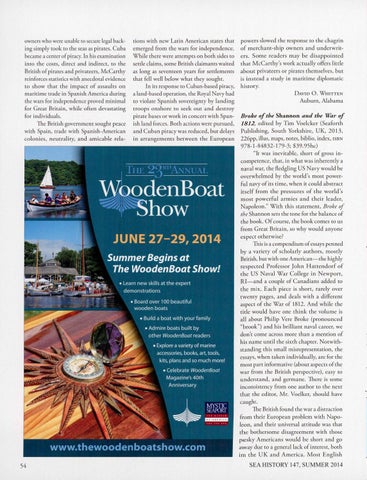owners who were unable to secure legal backing simply took to the seas as pirates. Cuba became a center of piracy. In his exam inatio n into the costs, direct and indirect, to the British of pirates and privateers, McCarthy reinforces statistics with anecdotal evidence to show that the impact of assa ults on maritime trade in Spanish America during the wars for independence proved minimal for Great Britain, while often devastating for individuals. The British government sought peace with Spain, trade with Spanish-American colonies, neutrality, and amicable rela-
54
tions with new Latin American states that emerged from the wars for independence. While there were attempts on both sides to settle claims, some British claimants waited as long as seventeen years for settlements that fell well below what they sought. In its response to Cuban-based piracy, a land-based operation, the Royal Navy had to violate Spanish sovereignty by landing troops onshore to seek out and destroy pirate bases or work in concert with Spanish land forces. Both actions were pursued, and Cuban piracy was reduced, bur delays in arrangements between the European
powers slowed the response to the chagrin of merchant-ship owners and underwriters. Some readers may be disappointed that McCarthy's work actually offers little abo ut privateers or pirates themselves, but is instead a study in maritime diplomatic history. DAVID 0. WHITTEN Auburn, Alabama
Broke of the Shannon and the
~r
of
1812, edited by Tim Voelcker (Seaforth Publishing, South Yorkshire, UK, 2013, 226pp, illus, maps, notes, biblio, index, ISBN 978-1-84832-179-3; $39.95hc) "It was inevitable, short of gross incompetence, that, in what was inherently a naval war, the fledgling US Navy would be overwhelmed by the world's most powerful navy of its time, when it could abstract itself from the pressures of the world's most powerful armies and their leader, Napoleon." With this statement, Broke of the Shannon sets the tone for the balance of the book. Of course, the book comes to us from Great Britain, so why would anyone expect otherwise? This is a compendium of essays penned by a variety of scholarly authors, mostly British, but with one American-the highly respected Professor John Hattendorf of the US Naval War College in Newport, RI-and a couple of Canadians added to the mix. Each piece is short, rarely over twenty pages , and deals with a different aspect of the War of 1812 . And while the tide would have one think the volume is all about Philip Vere Broke (pronounced "brook") and his brilliant naval career, we don't come across more than a mention of his name until the sixth chapter. Notwithstanding this small misrepresentation, the essays, when taken individually, are for the most part informative (about aspects of the war from the British perspective), easy to understand, and germane. TI1ere is some inconsistency from one author to the next that the editor, Mr. Voelker, should have caught. The British found the war a distraction from their European problem with Napoleon, and their universal attitude was that the bothersome disagreement with those presky Americans would be short and go a\Way due to a general lack of interest, both im the UK and America. Most English SEA HISTORY 147, SUMMER 2014
